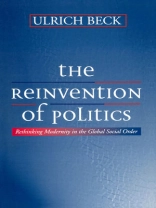Those who advocate ideas about ‘postmodernity’ and
‘post-industrialism’ offer radical critiques of existing social and
political institutions. But they provide very little in place of
those institutions. It is all very well to criticize the
limitations of social democracy, the welfare state, trade unionism,
and social classes as agents of change, but once these have been
thrown into crisis what other institutions do we have to depend on?
The Reinvention of Politics, suggests we should think again
about forging a new model of politics for our times. An active,
devolved civil society, Beck argues, can sustain the claim that
modernity is inherently democratic. For many issues now – for
example, those involving technology, environment protest, the
family, or gender relations – belong to the domain of what the
author calls ‘subpolitics’.
The postmodern critique of modernity, in Beck’s view, is based on
mistaken generalizations about a transitional phase in the
evolution of modern society. What is needed, he argues, is the
reinvention of politics, corresponding to th new demands of a
society which remains modern, but which has progressed beyond the
earlier form of industrial society.
This book will be essential reading for second-year undergraduates
and above in the fields of social and political theory, sociology
and political science.
Table of Content
Introduction.
1. The Age of Side Effects: On the Politicization of
Modernity.
2. The Construction of the Other Side of Modernity:
Counter-modernization.
3. Subpolitics – The Individual Returns to Society.
4. Ways to Alternative Modernities.
5. The Reinvention of Politics.
6. The Art of Doubt.
Notes.
Bibliography.
Index.
About the author
Ulrich Beck is Professor of Sociology at the University of Munich.












